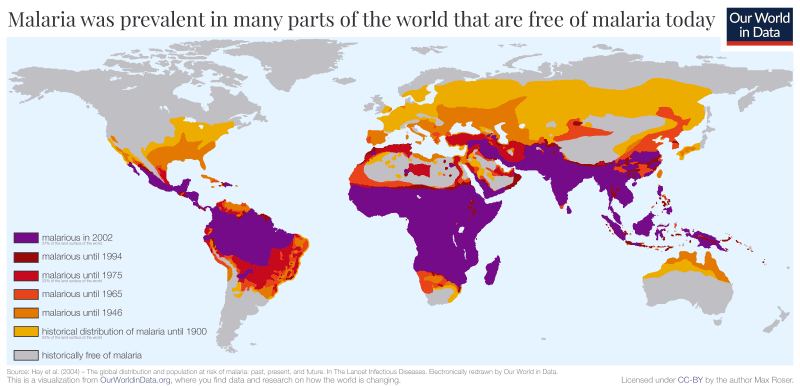
Drug may be major advance as malaria has developed resistance to existing treatments
Scientists at Oregon Health & Science University and the Portland VA Medical Center have developed a drug that may represent one of the world’s best hopes for treating and preventing malaria — a disease that kills more than one million people each year.
The scientists have described the drug, and its effectiveness against mice infected with malaria, in the March 20 issue of Science Translational Medicine, an interdisciplinary journal of the American Association for the Advancement of Science.
The drug — called ELQ-300 — “is an exciting compound as it ticks a number of boxes necessary in a next-generation antimalarial,” said Dr. Timothy Wells, the chief scientific officer for Medicines for Malaria Venture, a Swiss non-profit that is leading the scientific fight against malaria and that helped fund the research leading to ELQ-300. “It has potential to become part of a combination therapy that could cure patients, prevent infection and block the transmission of malaria — all at low-doses — which means fewer and smaller pills for patients, at a lower cost. Provided a formulation can be developed, ELQ-300 holds great promise to become a tool to help shrink the malaria map.”
Malaria infects more than 200 million people per year and kills more than 1.2 million — many of them children under 6 and many of them living in Africa.
The two main drugs that have been used to treat malaria over the last several decades — quinine and chloroquine — have become less effective as the parasite that causes malaria has become resistant to the drugs.
As described in Science Translational Medicine, ELQ-300 was extremely potent against malaria in mice. It also has another distinct advantage: it targets the parasite that causes malaria much earlier in the process than existing drugs do. Most of the drugs in clinical use today target a form of the parasite only after it has unloaded millions or even billions of “merozoites” into the human bloodstream. ELQ-300 targets the parasite earlier when it is in the liver, and when its numbers are much lower, before anything has spilled into the bloodstream.
That means the drug can be incredibly potent and may be able to not only treat malaria in a single dose, but also prevent malaria before any serious disease symptoms develop.
“We believe ELQ-300 has a chance to change the landscape of how we fight malaria across the world,” said Michael Riscoe, Ph.D., principal investigator in the research, a professor of molecular microbiology and immunology at OHSU and director of the Experimental Chemotherapy Lab at the Portland VA Medical Center.
One distinct advantage of the drug could be its potency — that it could treat malaria in a single dose. A major problem with existing malaria drugs is that they require multiple doses over a number of days to achieve a cure. If people miss a dose, that means the drug won’t work, and it allows the parasite to develop resistance against the drug, Riscoe said.
With a drug that only requires a single dose, a medical professional or aid worker can observe a person taking the medicine to ensure compliance.
Any new anti-malarial drug also would become part of a drug “cocktail” and be used in combination with other drugs to prevent the emergence of resistance, Riscoe said.
Malaria is a major health problem in tropical areas. It accounts for 40 percent of all public health spending in Africa. It also presents a major disease hazard to travelers in the tropics and subtropics.
The Latest Bing News on:
Malaria
- Malaria infection may accelerate ageing process: Studyon May 3, 2024 at 7:52 am
Malaria infection is associated with genetic changes related to aging. Researchers analyzed telomere length, which protects chromosomes, in adults from malaria-endemic African regions. They found shorter telomeres in white blood cells of individuals from highly endemic areas.
- Malaria may shorten leukocyte telomeres among sub-Saharan Africans, study findson May 2, 2024 at 8:01 am
The length of telomeres in white blood cells, known as leukocytes, varies significantly among sub-Saharan African populations, researchers report in The American Journal of Human Genetics. Moreover, leukocyte telomere length (LTL) is negatively associated with malaria endemicity and only partly explained by genetic factors.
The Latest Google Headlines on:
Malaria
[google_news title=”” keyword=”malaria” num_posts=”10″ blurb_length=”0″ show_thumb=”left”] [/vc_column_text]The Latest Bing News on:
Malaria drug
- Deeper understanding of malaria parasite development unlocks opportunities to block disease spreadon May 2, 2024 at 3:21 pm
Natural malaria infections have been genetically analysed at a higher resolution than ever before, giving insights that could help understand and block transmission.
- Malaria Parasite Alters Gene Usage to Prepare for Transmissionon May 2, 2024 at 11:01 am
The Wellcome Sanger team suggests the novel insights accessible through the Malaria Cell Atlas may also help to identify new drug or vaccine-based strategies for blocking the parasite’s development ...
- Deeper understanding of malaria parasite sexual development unlocks opportunities to block disease spreadon May 2, 2024 at 11:00 am
For the first time, the developmental stages of the deadliest human malaria parasite have been mapped in high resolution, allowing researchers to understand this ever-adapting adversary in more detail ...
- New monoclonal antibody vaccine slashes malaria risk in childrenon April 30, 2024 at 8:19 pm
A recent study demonstrates that the monoclonal antibody-based vaccine L9LS is safe for children aged 6 to 10 and significantly reduces the risk of malaria infection and clinical symptoms by 70% and ...
- Malaria Day: Nigerians lament 23% hike in anti-malaria drug priceon April 25, 2024 at 7:09 pm
NIGERIA joined the rest of the world to commemorate World Malaria Day on Thursday, with patients lamenting the about 23 per cent ...
- Kenya: Local anti malaria drug production signals progresson April 25, 2024 at 2:35 am
"If we get more investment in manufacturing of medicines and essential medicines, including antimalarial, where the problem is, then we are likely to be more effective in addressing the problem, ...
- Malaria is still killing people in Kenya, but a vaccine and local drug production may helpon April 25, 2024 at 2:12 am
Public health expert Dr. Willis Akhwale, special adviser for the Kenya End Malaria Council, said the COVID-19 pandemic slowed down distribution of drugs and treatment. He said innovative treatment ...
- Malaria is still killing people in Kenya, but a vaccine and local drug production may helpon April 25, 2024 at 12:17 am
Malaria is still a significant public health challenge in Kenya, but an important pilot of the world’s first malaria vaccine may help.
- World Malaria Day: Volatile naira slows Nigeria’s $23m Malaria drug factoryon April 24, 2024 at 7:00 pm
The completion of a mega anti-malaria plant in Nigeria, which reported the most cases of the deadly disease globally in 2023, is ...
- Malaria Is Still Killing People in Kenya, but a Vaccine and Local Drug Production May Helpon April 24, 2024 at 6:06 pm
Malaria Is Still Killing People in Kenya, but a Vaccine and Local Drug Production May Help MIGORI, Kenya (AP) — As the coffin bearing the body of Rosebella Awuor was lowered into the grave ...
The Latest Google Headlines on:
Malaria drug
[google_news title=”” keyword=”malaria drug” num_posts=”10″ blurb_length=”0″ show_thumb=”left”]










